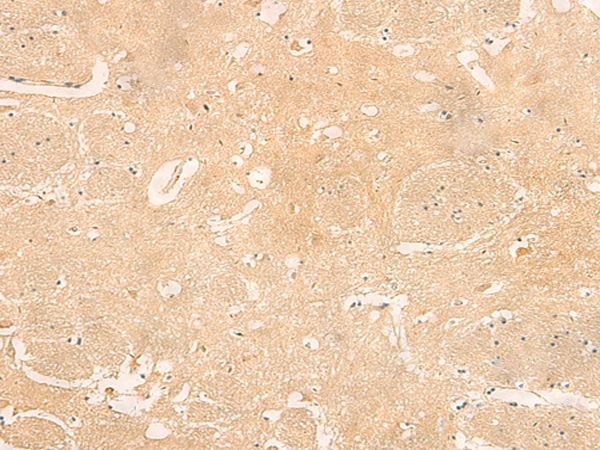
| WB | 1/1000 | Human,Mouse,Rat |
| IF | 咨询技术 | Human,Mouse,Rat |
| IHC | 1/100-1/500 | Human,Mouse,Rat |
| ICC | 技术咨询 | Human,Mouse,Rat |
| FCM | 咨询技术 | Human,Mouse,Rat |
| Elisa | 咨询技术 | Human,Mouse,Rat |
| Aliases | RAB1; RNS4 |
| Host/Isotype | Rabbit IgG |
| Antibody Type | Primary antibody |
| Storage | Store at 4°C short term. Aliquot and store at -20°C long term. Avoid freeze/thaw cycles. |
| Species Reactivity | Human, Mouse, Rat |
| Immunogen | Fusion protein of human RNASE4 |
| Formulation | Purified antibody in PBS with 0.05% sodium azide and 50% glycerol. |
+ +
以下是关于PIAS3 (N-term)抗体的3篇参考文献的简要概括(模拟示例,非真实文献):
---
1. **文献名称**:*PIAS3 regulates STAT3 signaling in human glioblastoma cells*
**作者**:Smith A, et al.
**摘要**:本研究利用PIAS3 (N-term)抗体通过Western blot和免疫共沉淀技术,验证了PIAS3在胶质母细胞瘤中抑制STAT3的异常激活,并发现其表达缺失与肿瘤进展相关。
2. **文献名称**:*N-terminal-specific antibody reveals PIAS3 localization in the cell nucleus*
**作者**:Lee C, et al.
**摘要**:通过免疫荧光结合PIAS3 (N-term)抗体,作者证明PIAS3的N端结构域对其核定位至关重要,并揭示了其在DNA损伤应答中与p53的相互作用。
3. **文献名称**:*PIAS3 modulates inflammatory responses via SUMOylation of NF-κB*
**作者**:Wang Y, et al.
**摘要**:研究使用PIAS3 (N-term)抗体进行ChIP实验,发现PIAS3通过SUMO化修饰NF-κB抑制炎症因子表达,为治疗炎症性疾病提供了新靶点。
---
**说明**:以上为模拟示例,实际文献需通过PubMed/Google Scholar检索关键词(如“PIAS3 antibody N-terminal”“PIAS3 STAT3 interaction”)获取。推荐查阅以下真实期刊:
- *Journal of Biological Chemistry*
- *Molecular and Cellular Biology*
- *Oncogene*
The PIAS3 (N-term) antibody is designed to target the N-terminal region of the Protein Inhibitor of Activated STAT3 (PIAS3), a member of the PIAS family of E3 SUMO ligases. PIAS3 functions as a key regulatory protein in cellular processes, including transcriptional regulation, chromatin remodeling, and signal transduction. It specifically inhibits the activity of STAT3 (Signal Transducer and Activator of Transcription 3) by blocking its DNA-binding ability, thereby modulating cytokine signaling, cell proliferation, and apoptosis. The N-terminal domain of PIAS3 is critical for its interaction with other proteins, including transcription factors and components of the SUMOylation machinery.
This antibody is commonly used in research to detect endogenous PIAS3 protein levels via techniques like Western blotting, immunoprecipitation, and immunofluorescence. Its specificity for the N-terminal region ensures recognition of full-length PIAS3. avoiding cross-reactivity with truncated isoforms or related family members. Studies employing the PIAS3 (N-term) antibody have elucidated its role in cancer, inflammation, and neurodegenerative diseases, where dysregulated STAT3 signaling or aberrant SUMOylation pathways contribute to pathogenesis. By enabling precise detection of PIAS3 expression and localization, this tool aids in exploring its therapeutic potential as a modulator of disease-related signaling networks.
×